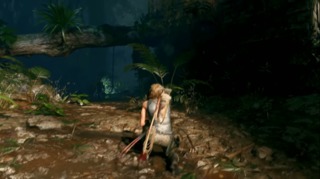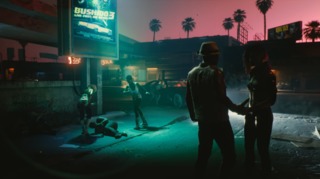E3 2018: The Rest
By gamer_152 0 Comments

Every year at E3, there are shorter conferences and a lot of little previews of games that can't add up to a full article but are still worth mentioning so let's talk about the briefer briefings and lower-key show floor games of E3 2018.
Devolver Digital

You could probably write the number of people who were impressed with Devolver's 2017 conference on one hand, but I'd be on that list. Last year, Devolver delivered a violent and scathing satire of E3. Their cruel and sociopathic host, Nina Struthers became a vessel through which to criticise the brutality of the industry and a worship of consumerism for consumerism's sake. Their 2018 show was the same bloody Colosseum of contempt, and while a lot of people regarded it as a rote replay of their last performance, Devolver used 2017's template to make fresh criticisms.
They acknowledged how the press conferences make use of parasocial relationships and dazzling graphics to distract from a lack of substance in what presenters are saying. Struthers reminded us that the demos are not as organic as we think and that execs often aren't playing the games they're touting as the zenith of the medium. While other publishers tried to present an over-reliance on lootboxes as a mistake companies made in a few isolated instances, Devolver also turned their sights on the community for funding the lootbox model and referenced the lack of regulation around them as a cause of the recent debacle. Their press conference was once again gratifying because of its honesty about the industry in a setting where there's so much spin, and even if you want to write it off as a joke, you have to admit there's no other publisher at E3 who put a queer woman front and centre for their presser.
Square Enix

Even more than the Tomb Raider adventures themselves, the marketing materials for the series have cared not just about what Lara Croft does but who her adventures make her. 2013's Tomb Raider was intended to show how Lara's injury and terror on a visit to an inhospitable jungle hardened her into the iconic character we associate with these games. But now Crystal Dynamics have their intrepid survivalist they don't have much clue what to do with her. Because these are games about exploring wilds and ruins she can't undergo any transformative experience she hasn't before, and if she grew as a person, they'd also risk writing a character who strayed from the one they've been marketing. Their only solution has been to create ever-more painful and elaborate ordeals for their protagonist to go through, to the point that it's comical now. Lara Croft looking back from her cockpit to find it had ripped off the front of the plane would be right at home in a Leslie Nielsen film. This inertia in Lara herself also carries over to the series' mechanical development. That is to say, there's very little of it, although, the demo for Shadow of the Tomb Raider delved further into stealth and mind games than those before, perhaps looking to reinstate these concepts in Square Enix's catalogue after they cut Hitman loose.
Dragon Quest 11 is a game with an ugly action figure art style. When artists draw a 2D character, the choices they make about that character's design are relevant to them being displayed with a flat perspective, so you can't just convert them into 3D and take it as a given that they won't look freakish. Unlike Dragon Quest, Octopath Traveller puts 2D characters in a 3D world with a style that's not just tolerable, but alluring; it's 2D sprites in a 3D diorama. While E3 is full of frivolous tech demos, the physics demonstrations for Just Cause 4 mattered because it's a physics sandbox, although I don't care about smarter AI in that game; the appeal of Just Cause was never how much it pushed back against you, but how spectacularly it crumbled at your touch. Lastly, there was The Quiet Man, a demo featuring a fist-hurling deaf twenty-something. The developers of that game have a decision to make that they shouldn't take lightly. Empathetically conveying the experiences of the disabled through this medium means inhibiting the player in some way because that's what disability is. It doesn't mean the player can't then be empowered through other means, but I have doubts about the AAA industry's willingness to take any choice that limits player perception or agency.
The PC Gaming Show

There were no better hosts this year than the presenters of the PC Gaming Show: the professional but amiable Sean "Day[9]" Plott and the incorrigibly lively Frankie Ward, but this show also had the unique appeal of a gallery of B-tier of games that aren't well-oiled enough or catering enough to mainstream interests to appear on any other stage. Unfortunately, the same forces which make the PC a highly open platform for creators also mean that it lacks quality control. From where I'm standing, battle royale is a method of organising exploration, inventory management, and combat between players, but the places players explore, the items they collect, and how combat is resolved are all aspects that designers theoretically have a lot of creative agency to change. In reality, battle royale games require absurdly large player bases to operate and so instead of it being a genre of innovation, almost all battle royale development has come down to a question of whether to rip off Fortnite (as Realm Royale is doing) or PUBG (as Maverick's Proving Grounds is doing). Maverick's Proving Grounds came off as a particularly pointless game, pitched as PUBG but with up to 1,000 players, making it far harder for it to draw in and retain the userbase it needs to run for no obvious advantage. And if Fortnite is getting sued for copyright infringement, god knows what that means for these games.
But where people were using the power of the PC for good, you got experiments like Neo Cab, a story of driving the last human-operated taxi in a cyberpunk city. It looks like it will give you the vertical slice of a futuristic society that VA-11 HALL-A did but without that game's restrictive inability to show character lives beyond the bar. There was Sable, a sci-fi that was painted like a living Moebius piece and had the most creative art direction I've seen at the expo. Ooblets appeared as a cross between Stardew Valley and Pokémon but where an adorable style better makes the darling fruits of your labour all the sweeter. Then there was Maneater which, as a simulator in which you're a shark eating people, is the last game at the show you could accuse of being formulaic.
Extra Thoughts

• The premise of The Crew was that if about 8 hours of loose, ghostly driving would be okay, then 20 hours of it must be fantastic. Just based on word of mouth, it doesn't seem that the controls in The Crew 2 closed beta were any better than the original's, or that its mixture of aerial, terrestrial, and aquatic racing makes up for it. Games are at their best when there is a dynamism between their mechanics, but it sounds like Ubisoft just dumped three kinds of driving in the same place without the interrelation between them that their trailer this year would suggest. I hope this beta isn't representative of the final product, but the handling of the vehicles is fundamental enough that it's unlikely they'll fix them by the time this game comes out.
• I'm generally supportive of Destiny 2's Gambit mode, but I do wonder if fighting the same boss over and over will get tiring after not too long.
• The opening and closing moments of The Last of Us II demo felt like what David Cage always thought he was making. Advanced animation techniques, especially those that capture subtleties of human expression, enabled an emotional experience that kicks like a horse. Obviously, the reason that Naughty Dog can do it when Quantic Dream couldn't is that their script had a rhythm and naturalness that Cage's have never had.

• The Adaptive Controller is still a mind-blowing piece of hardware. Companies typically come up short in making their games accessible to the disabled because they consider the cost of opening up a game to people with any specific disability too high in comparison to the return on investment they'll get from that tiny minority. This is why the Adaptive Controller feels like such an unlikely piece of kit, and it works because it doesn't presume what interfaces with the game will be most helpful to the user. It knows that disabilities are unique and so instead of being a single option on a menu somewhere, it's a toolkit which allows the player to configure the controller setup which best works for them.
• Even if I'm sceptical of the way that Control will... Well, control, the world of this game sounds like everything I'd want, taking cues from horror like House of Leaves and the SCP Foundation.
• Beyond Good & Evil 2 has you creating a character to participate in its world under the narrative justification that citizens in its universe are spliced together from banks of DNA. I love the idea of a diegetic character creation process as it means there's less we have to justify through the "It's a video game" defence and more play that feels organic to its world.

• Speaking of which, Cyberpunk 2077 is a game which uses the logic that your character would see menus through their AR augments as a way to present a GUI in-world. Overall, 2077 sounds like the holy grail of cyberpunk games I wanted for so long but never found. Its map is more seamless than that of the last couple of Deus Exes, but it's more cyberpunk than Watch_Dogs. It doesn't shy away from presenting the disparity between rich and poor and the consequences of that inequality, and it feels more in line with the slang-soaked, oppressive cyberpunk novels of the 80s and 90s than any other video game I've come across. For that matter, I've never been as excited about a closed-doors demo of a game at E3, nor can I recall a game at the expo which so unanimously united critics looking for escapism and those looking for an interrogation of the real world.
___
Thanks for reading.